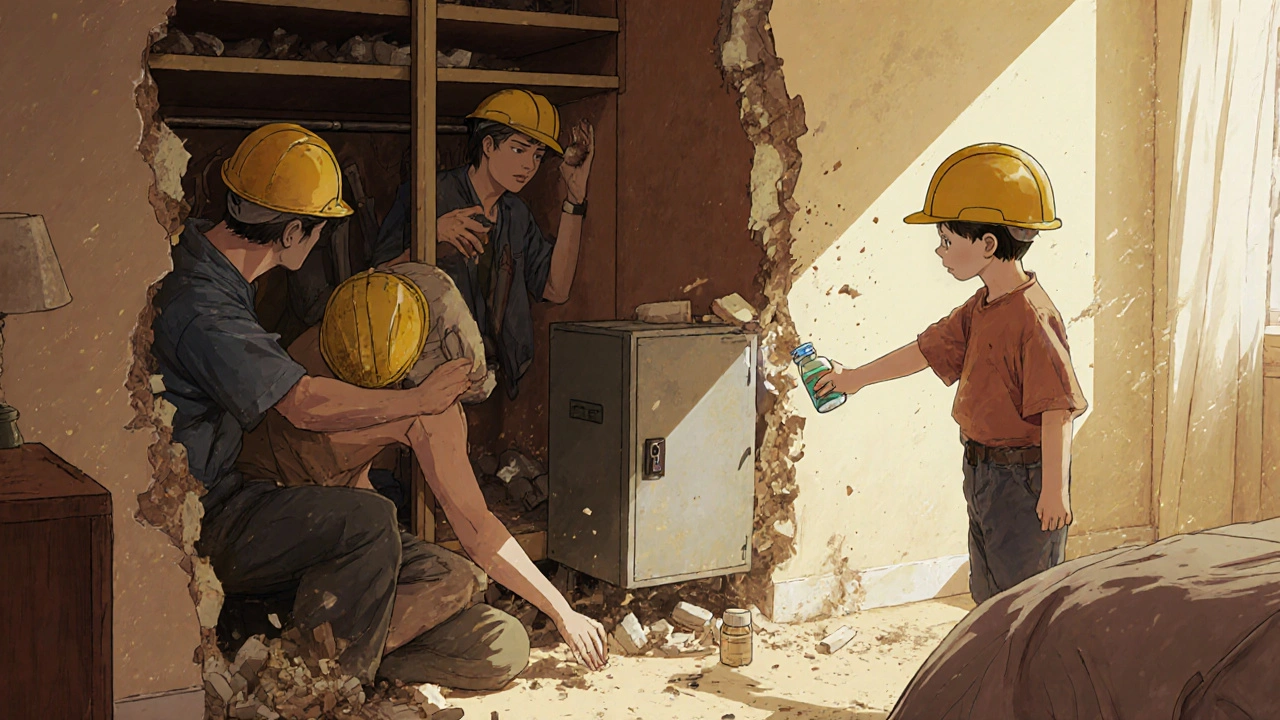How to Secure Medications During Home Renovations or Moves
 Nov, 16 2025
Nov, 16 2025
When you’re tearing down walls or packing up your life for a new home, your medications shouldn’t be an afterthought. A bottle of painkillers left on a dusty shelf, insulin sitting in a hot car, or a child finding a pill bottle in a moving box-these aren’t just risks. They’re preventable emergencies.
Why Medications Are at Risk During Moves and Renovations
Most people don’t think about their meds until they’re packing boxes or cleaning out cabinets. But here’s the truth: 55% of Australian households have prescription medications on hand, and nearly 70% of those aren’t stored properly-even when nothing’s changing. During renovations or moves, those already shaky habits get worse. Heat, humidity, and chaos turn your medicine cabinet into a hazard zone. Medications don’t handle temperature swings well. Insulin, thyroid pills, and even common antibiotics can lose effectiveness if they freeze or overheat. Moisture from steamy bathrooms or damp basements breaks down pills faster than you’d think. And if your meds are sitting out in the open while workers come and go? That’s a recipe for accidental poisoning, especially with kids or pets around.Step 1: Sort and Clean Out Before You Start
Don’t just pack everything. Take time-before the dust flies or the movers arrive-to go through every pill bottle, patch, and liquid vial.- Check expiration dates. If it’s old, toss it. No exceptions.
- Look for pills that are discoloured, cracked, or smell strange. Throw those out too.
- Separate controlled substances: opioids like oxycodone, fentanyl patches, or benzodiazepines like Xanax. These need special handling.
Step 2: Pick a Secure, Stable Storage Spot
You need a place that’s cool, dry, locked, and out of reach. That’s the golden rule. During renovations, avoid these spots:- Bathrooms (too humid)
- Kitchen cabinets above the stove (too hot)
- Garages or sheds (temperature swings)
- Anywhere near construction dust or paint fumes
Step 3: Protect Temperature-Sensitive Medications
Some meds need fridge temps (2°C-8°C). Others must stay between 15°C and 25°C. If you’re moving in summer, this is critical. For insulin, epinephrine pens, or certain biologics:- Use a small insulated cooler with a cold pack (not frozen)
- Keep it with you in the car, never in the trunk
- Check the temperature with a small thermometer if you can
- Never let it freeze-frozen insulin is useless and dangerous

Step 4: Keep Everything Labelled and Organised
Never transfer pills to a different container. Ever. Why? Because if your child finds a random bottle with no label, they won’t know what it is. Same if you’re in a hurry at your new place and need your blood pressure pill. Keep everything in original bottles. If the label is fading, write the name, dose, and instructions on a sticky note and tape it to the bottle. Don’t rely on memory. Create a simple list:- Medication name
- Dose (e.g., 10mg once daily)
- Why you take it (e.g., “for high blood pressure”)
- Pharmacy and contact info
Step 5: Talk to Your Pharmacist or Doctor
Don’t guess. If you’re unsure about a medication’s storage needs, call your pharmacist. They know the exact temperature range, stability limits, and disposal rules for every drug they dispense. Ask:- “Does this need refrigeration?”
- “Is it safe to transport in heat?”
- “Can I switch to a different form if it’s hard to store?”
What to Do After You Move
Once you’re settled, don’t just toss your meds into the new cabinet. Do a quick reset:- Check all bottles for damage or moisture
- Confirm temperatures in your new storage spot
- Reorganise everything so it’s still locked and out of reach
- Update your list if you’ve refilled anything

Common Mistakes to Avoid
- Putting meds in the moving truck-too risky for heat, cold, or theft
- Leaving them in the bathroom during renovations-moisture ruins pills
- Throwing old meds in the trash without mixing them with dirt or coffee grounds
- Assuming “it’s still good” because it looks fine-meds degrade invisibly
- Not telling your pharmacist you’re moving-some meds need special handling
What to Do If You Find a Lost or Unlabelled Pill
If you find a pill you don’t recognise during a move or renovation:- Don’t take it
- Don’t throw it in the trash
- Take it to your nearest pharmacy-they can identify it
- Call Poisons Information Centre on 13 11 26 (Australia-wide)
Can I store my medications in the garage during renovations?
No. Garages get too hot in summer and too cold in winter. Most medications break down in temperatures outside 15°C-25°C. Humidity and dust also ruin pills. Always keep them indoors, in a locked, climate-controlled space.
What if I need my medication while the house is being renovated?
Keep a small, labelled, locked container with your daily meds in a room that won’t be disturbed-like a bedroom closet. Pack only what you need for the next few days. Never leave extra pills out in the open. If you’re unsure, ask your pharmacist for a travel-sized supply.
How do I dispose of old medications safely in Sydney?
Take them to any pharmacy that offers a take-back program-Chemist Warehouse, TerryWhite Chemmart, and many local pharmacies do. Some councils hold annual collection days. Never flush unless the label says to. For high-risk drugs like fentanyl patches, flush immediately. For others, mix with coffee grounds, seal in a bag, and throw in the trash.
Is it safe to move insulin in a regular cooler?
Yes, but only if it’s not frozen. Use an insulated cooler with a cold pack-not ice cubes. Keep it with you in the car, not the trunk. Check the temperature with a thermometer if possible. Never let insulin freeze. If you’re unsure, call your pharmacist before moving.
Should I bring all my medications when moving?
Only bring what you’re currently using. Discard expired, unused, or duplicate medications before the move. This reduces clutter, risk, and weight. If you’re unsure, ask your pharmacist to help you sort through them. It’s safer and simpler.


saurabh lamba
November 18, 2025 AT 12:48Shannon Hale
November 19, 2025 AT 18:42Jessica Healey
November 20, 2025 AT 21:28Eric Healy
November 21, 2025 AT 01:28Deb McLachlin
November 21, 2025 AT 04:00Levi Hobbs
November 22, 2025 AT 08:08Kelsey Robertson
November 24, 2025 AT 02:02Shannon Hale
November 24, 2025 AT 09:39Gordon Mcdonough
November 25, 2025 AT 05:32Holli Yancey
November 25, 2025 AT 16:13Sridhar Suvarna
November 26, 2025 AT 09:14Joseph Peel
November 27, 2025 AT 04:21Kiran Mandavkar
November 28, 2025 AT 07:45